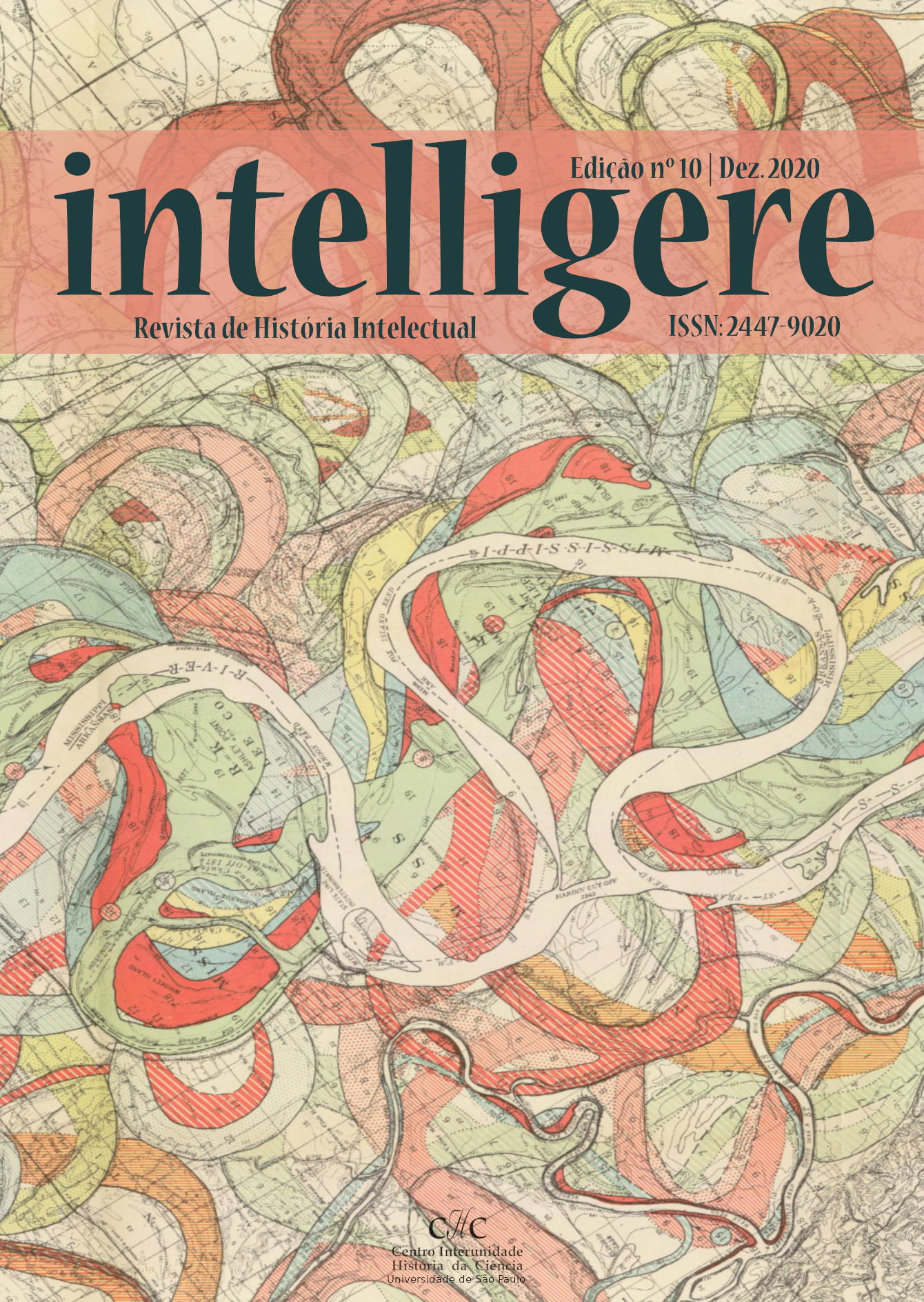Discussing concepts for a Brazilian school of international relations: an epistemological debate - Audrey Alejandro and Amado Cervo's formulations
DOI:
https://doi.org/10.11606/issn.2447-9020.intelligere.2020.178403Keywords:
Critical theory, Concepts, Eurocentrism, Global South, Scientific reserach, InternacionalizationAbstract
This article starts from a review proposal of the book “Western Dominance in International Relations? The Internationalisation of IR in Brazil and India”, written by Audrey Alejandro. The aim of this article is to discuss some ideas related to the possibility of the internationalisation of the Social Sciences of the Global South knowledge. We focus on IR theory and the fact that it would not be conditioned by Western dominance. Paradoxically, for her, the reproduction of critical and anti-Eurocentric discourses reinforces the very Eurocentric theorization that has been criticized. In this sense, Amado Cervo's intellectual contribution on the relations between concepts and theories in the teaching of IR in Brazil can help to reflect on the paradox raised by Alejandro. In this article, we put the debate of both authors in an analytical and comparative perspective. According to Alejandro, the idea of a Brazilian (and Indian) theory is not explicit, but she also suggests that there are important basis for its developments. According to Amado Cervo's interpretation, we conclude that theory has instrumental use, but this does not eliminate the need to develop explanatory theories, differently from what he suggests. At the same time, we recognize the importance of concepts originating from cognitive history. Regarding a Brazilian theory of IR, we consider that Alejandro's answer is a middle way. There is not a full theoretical design, but there are good backgrounds to progress.
Downloads
References
ACHARYA, Amitav; BUZAN, Barry. Why Is There No Non-Western International Relations Theory? An Introduction. International Relations of the Asia-Pacific, 2017.
ALEJANDRO, Audrey. Western Dominance in International Relations? The Internationalisation of IR in Brazil and India. London/New York: Ed. Routledge, Taylor and Francis Group, 2018.
ANGELL, Norman. A Grande Ilusão. Instituto de Pesquisa em Relações Internacionais. São Paulo, 2002.
AYDINLI, Ersel; MATHEWS, Julie. Periphery Theorising for a Truly Internationalised Discipline: Spinning IR Theory out of Anatolia. Review of International Studies 34 (4): 693–712, 2008.
BERNAL-MEZA, Raul. América Latina en el Mundo: El Pensamiento Latinoamericano y la Teoria de Relaciones Internacionales. Nuevohacer, 2005.
BRITO-CRUZ, Carlos Henrique de. Ajuda Acadêmica [Mensagem Pessoal]. Mensagem recebida pelos autores em 14 julho 2019.
CERVO, Amado L. Entrevista concedida a Celso Castro (2007) para a Memória das Ciências Sociais no Brasil, Centro de Pesquisa e Documentação de História Comtemporânea do Brasil (CPDOC), Fundação Getúlio Vargas (FGV), Rio de Janeiro, 2018.
CERVO, Amado L. Entrevista concedida a Audrey Alejandro, Professora de Metodologia da London School of Economics and Political Science (LSE), em virtude da pesquisa para o livro Western Dominance in International Relations? Internationalisation of IR in Brazil and India. Brasília, 2012.
CERVO, Amado L. Inserção Internacional: Formação dos conceitos brasileiros. Editora Saraiva, 1 ed., 2008a.
CERVO, Amado L. Conceitos em Relações Internacionais. Rev. Bras. Polít. Int., 51 (2), 2008b.
CERVO, Amado L. Política exterior e relações internacionais do Brasil : enfoque paradigmático. Rev. Bras. Pol. Int., vol. 46, n. 2, 2003.
COX, Robert W. Social forces, States and world order: beyond international relations theory. In: Keohane, Robert. (org.) Neorealism and its critics. Columbia University Press, 1986.
CRUZ, Sebastião C. Velasco e. Um outro olhar sobre a análise gramsciana das organizações internacionais. Rev. bras. Ci. Soc., São Paulo, v. 15, n. 42, 2000.
DESCH, Michael C. Cult of the irrelevant: the Waning Influence of Social Science on National Security. Princeton University Press, 2019.
HABERMAS, Jürgen. Technology and Science as Ideology. In Toward a Rational Society. London: Heinemann, 1971.
LESSA, Antônio Carlos. O Ensino de Relações Internacionais no Brasil. In O Crescimento Das Relações Internacionais No Brasil, edited by José Flávio Sombra Saraiva and Amado Luiz Cervo, 33–50. Brasília: IBRI, 2005.
LIMA, Maria Regina Soares de. Entrevista concedida ao episódio 4 do programa Caminhos, da Universidade Estadual do Rio de Janeiro (UERJ). Rio de Janeiro, 2020.
MARTINS, Estevão Chaves de Rezende. Relações Internacionais: visões do Brasil e da América Latina. Instituto Brasileiro de Relações Internacionais. Fundação Alexandre de Gusmão, FUNAG, 2005.
PUCHALA, Donald. Visions of International Relations. Columbia, SC: University of
South Carolina Press, 2002.
ROSENBERG, Justin. The empire of civil society: a critique of the realist theory of international relations. Londres: Verso, 1994.
TICKNER, Arlene B; WEAVER, Ole. International Relations Scholarship around the World. Abingdon, New York: Routledge, 2009.
TICKNER, Arlene B; BLANEY, David L. Thinking International Relations Differently. Worlding Beyond the West. Routledge, eds. 2012.
VIGEVANI, Tullo; THOMAZ, Laís F.; LEITE, Lucas. Pós-Graduação em Relações Internacionais no Brasil: Anotações sobre sua institucionalização. Revista Brasileira de Ciências Sociais, vol.31, n.91, 2016.
WANG, Jiangli; BUZAN, Barry. The English and Chinese Schools of International Relations: Comparisons and Lessons. The Chinese Journal of International Politics, 1-14, 2014.
Downloads
Published
Issue
Section
License
Copyright (c) 2020 André Sanches Siqueira Campos

This work is licensed under a Creative Commons Attribution 4.0 International License.
Autores que publicam em Intelligere concordam com os seguintes termos:
- Autores mantém os direitos autorais e concedem à revista o direito de primeira publicação, com o trabalho simultaneamente licenciado sob a Licença Creative Commons Attribution que permite o compartilhamento do trabalho com reconhecimento da autoria e publicação inicial nesta revista.
- Autores têm autorização para assumir contratos adicionais separadamente, para distribuição não-exclusiva da versão do trabalho publicada nesta revista (ex.: publicar em repositório institucional ou como capítulo de livro), com reconhecimento de autoria e publicação inicial nesta revista.
- Autores têm permissão e são estimulados a publicar e distribuir seu trabalho online (ex.: em repositórios institucionais ou na sua página pessoal), com reconhecimento da autoria e publicação inicial nesta revista.




